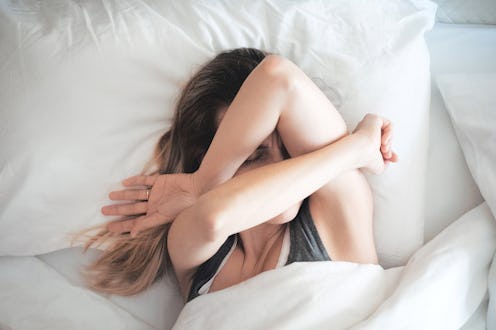Life
This Is Why Your Dreams Are Really Weird When You’re Sick
Can we all just collectively agree that dreams are, like, really cool? It’s like your mind has this whole alternate life. Even though researchers are constantly studying sleep and trying to get a better grasp on what really happens when we dream, there’s still so much no one knows about how dreaming really works and how they are connected to your physical health, because, let's face it, the brain is super complicated. Being sick can indeed affect your dreams — and in some pretty weird ways.
There are lots of different theories about what dreams actually are, clinical sleep psychologist Dr. Michael Breus explains, but it’s commonly believed that dreams are the brain’s interpretation of memories that being moved from short to long term memory during REM sleep. "When a memory is becoming a long term memory, your brain associates it with other memories – that's what creates recall. Then if you see or smell something you'll think of a memory associated with that," Dr. Brues tells Bustle. "Researchers think that's what creates dreams." Of course, because dream experiences are so subjective, they're pretty difficult to study, but science is making inroads in certain areas.
As it turns out, this process can be affected by changes in your mental or physical health, which can lead to variations in how you’ve been dreaming. It all boils down to one important fact: “The body is all interconnected,” Dr. Breus says. “Dreaming occurs in the brain so it is largely related to mental health, but I would say that between 25 and 30% of it is physical too.”
One of the biggest reasons sleep is impacted by your physical health is due to the connection between your sleep cycle and your core body temperature. At the end of the sleep cycle and when most dreaming takes place, during REM sleep, your body temperature should be lower, Dr. Breus explains. But if you have a cold or flu, that will impact your body's ability to regulate its temperature and could impact your dreams or make it more difficult to sleep.
Another major contributor to your dream life are your thoughts while awake – especially immediately before you fall asleep. If you’ve been fretting over a health condition lately, that will likely resurface while you’re sleeping too, Dr. Breus says. This can result in stress dreams or a related physical condition appearing in your dream. For example, if you've been having a lot of lower back pain, it would make sense if you have a dream in which something happens to cause pain to your lower back.
Dr. Breus explains that he sees this a lot in patients with sleep apnea. "Sleep apnea can cause patients to stop breathing while asleep," he says. "While that's happening, these patients will often dream that a pillow is being placed over their face or they're drowning."
Aside from illnesses and conditions, Dr. Breus said that medications and hormones could have huge impacts on your dreamscape. That's why pregnant women often report very impressive dreams.
“It’s important to remember that the dream state doesn’t mean that the body is turned off,” Dr. Breus says. “The dream state is as active, and you could even argue more active, than when your eyes are open and your body is up and moving around.”
Your sleep can be just as indicative of your health as being awake. If you're worried about a sudden change in your dreaming patterns or a difficulty sleeping, don't be afraid to reach out to your doctor. A good night's sleep helps you feel better and function at your highest ability, so never discount a sleep problem as being unimportant.
